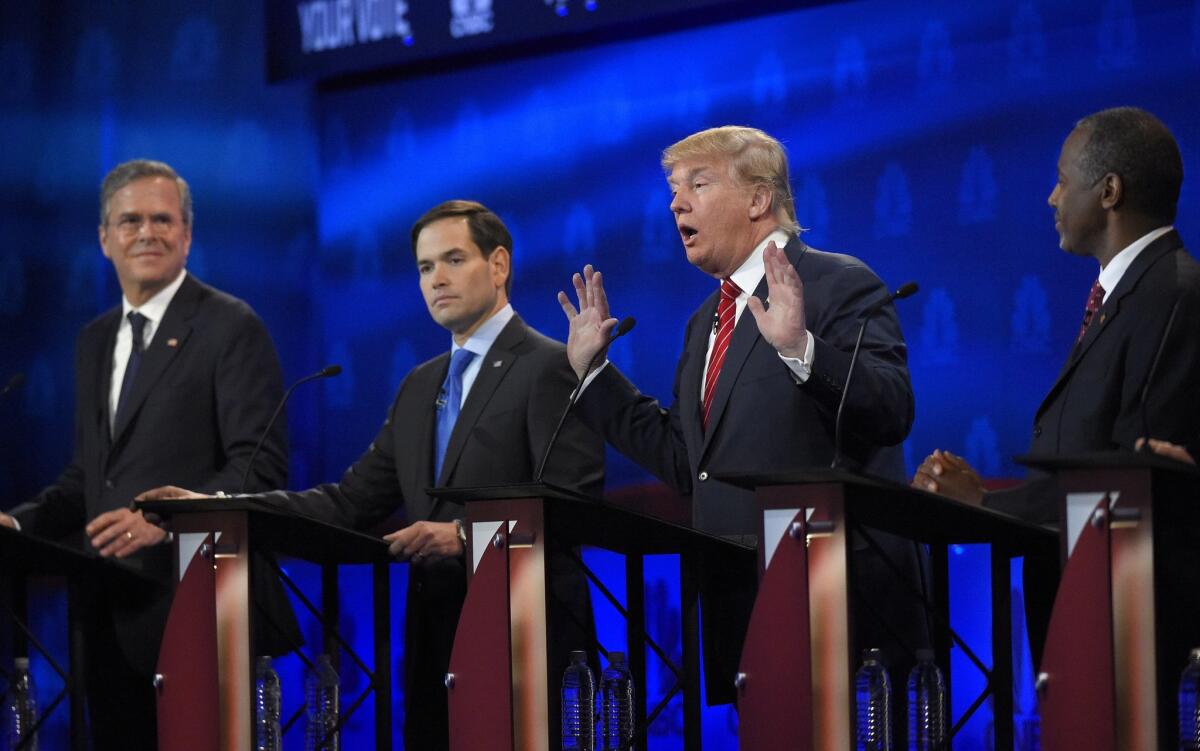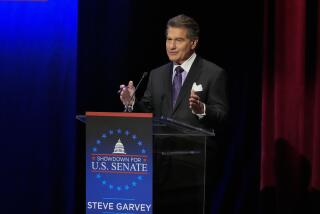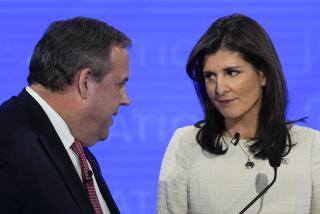Op-Ed: What debate moderators want

Republican presidential candidates Jeb Bush, Marco Rubio, Donald Trump and Ben Carson participate in the Republican presidential debate at the University of Colorado on Oct. 28.
The relationship between the Fourth Estate and the Republican political class may feel testier than usual these days. Ever since last month’s CNBC debate, when John Harwood asked Donald Trump, “Is this a comic-book version of a presidential campaign?” and Sen. Ted Cruz likened the event to a “cage match,” the GOP has cast the media as the Democratic arm of the “axis of evil.” At Tuesday’s Fox Business/Wall Street Journal-sponsored rumble, the easy money’s on the candidates attacking the questioners more than one another.
Interrogators are, more or less, behaving as they always have and White House wannabes are, more or less, reacting as they always have.
But — if I may — interrogators are, more or less, behaving as they always have and White House wannabes are, more or less, reacting as they always have. One absolutely consistent element is that no matter how much time journalists spend crafting tough, tight questions, candidates try to recite campaign talking points; and if they misspeak or think a nonresponse is simply impossible, they cry foul.
In 1988, I struggled to develop laser-focused queries for the first faceoff between Vice President George H.W. Bush and Massachusetts Gov. Michael Dukakis. Hobbled by campaign-imposed rules barring us from asking real-time follow-ups, my goals were modest: Strike a balance between pushy and wussy; provide the narrowest syntactical opening to keep combatants from mouthing canned rather than candid answers (ha!); and, yes, elicit at least one zinger of a response to raise my own profile and thus wrest a fat raise from my Orlando Sentinel bosses (ha! again).
I came closest with Bush, who’d held multiple positions on abortion before and since Roe vs. Wade in 1973: “Mr. Vice President, you now say that you support abortion only in cases of rape, incest or threat to a mother’s life, and you also support a constitutional amendment that if ratified would outlaw most abortions. But if abortions were to become illegal again, do you think that the women who defy the law and have them anyway … and the doctors who perform them should go to jail?”
His reply (herein heavily condensed) was strong enough to please antiabortion voters and vague enough to save his rhetorical bacon, while garnering some coveted attention for me.
“I haven’t sorted out the penalties. But I do know, I do know that I oppose abortion. And I favor adoption.... Once [abortion] illegality is established, then we can come to grips with the penalty side, and of course there’s got to be some penalties to enforce the law, whatever they may be.”
I yearned to press him on sanctions for insubordinate mothers and doctors but was bound by those onerous follow-up rules.
Two weeks later, CNN’s Bernard Shaw made headlines by asking Dukakis, a longtime foe of capital punishment, if he’d rethink the death penalty were his wife raped and murdered. A good answer would have begun, “While I’d want to kill the guy with my bare hands, we are a nation of laws.” Instead, Dukakis simply said no, followed by a startlingly dispassionate, utterly consistent defense of his position. Critics blasted Shaw for a tasteless “gotcha,” but millions of voters considered it a fair question with a politically disastrous answer.
More recently, in 2012, CNN’s John King ignited a firestorm with his leadoff question to former House Speaker Newt Gingrich during the South Carolina primary debate. King cited public allegations by the candidate’s ex-wife Marianne that he’d sought an “open marriage” during his affair with congressional aide Callista Bisek, whom he married months after his 2000 divorce.
The enraged Gingrich called King’s opener “despicable.” For the next three minutes, punctuated by applause from audience members, he denied Marianne’s allegations, assailed King and accused the “elite media” of attacking Republicans to protect President Obama. Sound familiar?
Seven White House cycles and countless debates after my 1988 exercise in democracy, the same civic and self-serving goals still attach to panelists and moderators: Hold candidates accountable, challenge misstatements, inform the public, make news and, let’s be frank, burnish the journalist’s brand.
Granted, the quadrennial Q&A isn’t exactly the same as it always was. (I did say “more or less.”) On the Republican side, the sheer number of candidates onstage has changed the dynamics. There’s less time for equal time, more need to play the room. And, yes, reality TV and social media seem to encourage trash-talking, while zillion-dollar “super PACs” keep cellar-dwelling hopefuls on life-support long after low poll numbers and dwindling campaign funds should have forced them out.
By the way, is it just me, or are debates louder now? I’d love to see decibel readings on all the shouting.
But in a sign that debates then and now have more in common than not, the struggling “Jeb Can Fix It” Bush announced a new debate strategy that isn’t really new at all: “I’ve got to train myself to say what’s on my mind rather that what the question is.”
Annie Groer is a former Washington Post and PoliticsDaily.com reporter and columnist who writes widely about politics, culture and design. She is at work on a memoir.
Follow the Opinion section on Twitter @latimesopinion and Facebook
More to Read
A cure for the common opinion
Get thought-provoking perspectives with our weekly newsletter.
You may occasionally receive promotional content from the Los Angeles Times.






